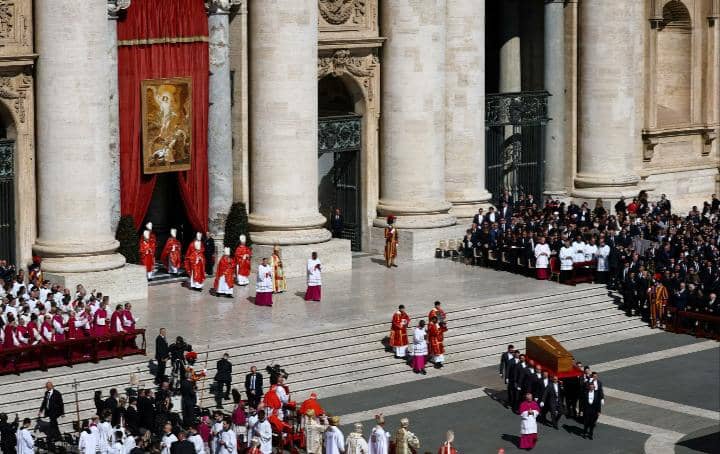
 Tiger FM
Tiger FM

 Tiger FM
Tiger FM
27 April 2025, 9:44 am
By Ronald Ssemagonja
Following the gathering of hundreds of thousands of people from around the world to bid farewell to the late Pope Francis, who passed away on Easter Monday and was buried in the side aisle of the Basilica of Saint Mary Major in central Rome, between the Pauline Chapel — home to his beloved icon of Our Lady Salus Populi Romani — and the Saint Orza Chapel, Cardinal Kevin Camerlengo and others led the final farewell. The event was witnessed by many leaders from various countries, including America’s Donald Trump, Ukraine’s Volodymyr Zelensky, Kenya’s William Ruto, and Uganda’s Speaker of Parliament, Rt. Hon. Anita Among, along with her deputy Rt. Hon. Thomas Tayebwa, among others.

“May we all be inspired by his legacy to live lives that honour God and show love to those around us,” Among said. The Pope is the first in over a century to be buried outside the Vatican, and his entombment was a private event, allowing those closest to him to pay their respects. Jorge Mario Bergoglio, the first Jesuit Pope, became Pope on 13th March 2013, following the resignation of the 85-year-old Pope Benedict XVI on 28th February 2013, and later passed away in 2022. The election of a new Pope is a highly mystified and sacred process. The last time the College of Cardinals gathered to vote and select the next Pope was more than 12 years ago. Whether by death or, in the rarer case of retirement, once the papacy is vacated, a successor must be selected.
The College of Cardinals, the Church’s most senior officials residing at the Vatican or spread across the world, will gather in Rome to choose the next Pope. As of 22nd January, there were 252 cardinals, of whom 138 are mandated to vote, according to the Vatican. Usually, within 15 to 20 days after the papacy is vacated, cardinal electors meet in the Sistine Chapel and begin the strictly secretive voting process. Throughout the conclave, cardinals are under an oath of silence and forbidden from contact with the outside world; they are to remain in the conclave until a new Pope is selected. This process can take as long as needed. In the 13th century, it took cardinals three years to elect Pope Gregory X, but in modern times, papal conclaves have been much shorter. The longest conclave in the 20th century lasted for five days, and in 2013, Pope Francis was elected in a little over 24 hours. Since the 14th century, no one has ever become Pope outside the rank of cardinal.
Some of the cardinals considered potential contenders to become Pope are: 65-year-old Cardinal Fridolin Ambongo, Archbishop of Kinshasa, Democratic Republic of Congo. He is the president of the Symposium of Episcopal Conferences of Africa and Madagascar and gained global attention for leading African bishops in their unanimous rejection of “Fiducia Supplicans”, a declaration issued by the Vatican in 2023 that included guidelines on the blessings of people in same-sex relationships. He is a champion of the poor and voiceless and is outspoken in his criticism of the Congolese government. Cardinal Peter Erdo, Archbishop of Budapest, Hungary, 72, is the highest-ranking Catholic leader in a country where 80% of the population is Christian. He is known for his support of the Pope’s outreach to Orthodox Christians.
Cardinal Mario Grech, Secretary-General for the Synod of Bishops, 68, from Malta, is a Canon lawyer who has significant influence on how synods in the Church are run. Cardinal Pietro Parolin, the Vatican’s Secretary of State, 70, is second-in-command at the Vatican and a career diplomat who has consistently risen above the turbulence marking the pontificate. Cardinal Pierbattista Pizzaballa, Latin Patriarch of Jerusalem, 60, is a pastoral candidate who has spoken out amid the Israel-Hamas war and visited Gaza during the conflict. Cardinal Luis Tagle of the Philippines, 67, is known for his missionary spirit. Cardinal Matteo Zuppi, Archbishop of Bologna, Italy, 69, is the president of the Italian Bishops’ Conference. Cardinal André Arborellius, Archbishop of Stockholm, 75, has a strong focus on environmental issues. Cardinal Gérald Cyprien Lacroix of Quebec, 67, from Canada, temporarily stepped back from his duties amid sexual abuse allegations, which he denied, and returned to his duties in 2024 after a Church-led investigation found no evidence of misconduct.